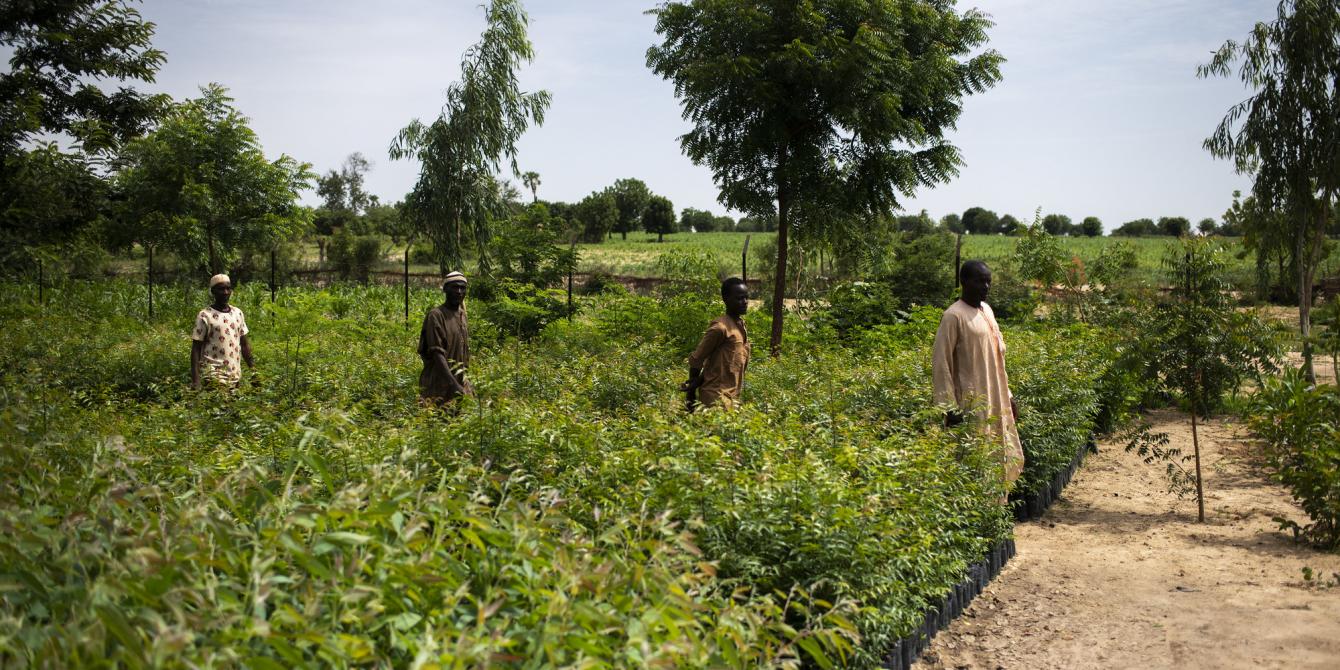
Farmers walking through the nursery, to pick up seedlings from the Moringa tree. The Fuel Wood Balance project implemented by Oxfam and partners in Katsina State, Nigeria, aims to combat desertification and encourages the adoption and promotion of agroforestry models with more than 5.5 million additional trees to help mitigate climate change effects while reducing fuel wood demand.
Covid-19: towards a solidarity and ecological economy and societies
The current global crisis offers unprecedented opportunities to build more future-oriented, united, and ecological societies.
In a media briefing dated April 9, 2020 entitled Dignity not Destitution, Oxfam declared: “The stimulus packages announced in response to te pandemic must not make the same mistakes. (…) Governments have the power and the responsibility to act now and to set in train profound changes to make our economy more human and more fit to address the climate emergency, keeping alive the chance of limiting global heating to 1.5°C.”
There is strong scientific evidence demonstrating the link between climate change and weather extremes and their adverse effects on public health resulting from epidemics. The manmade destruction of natural habitats increases the risk of the emergence of diseases and the spread of pathogens. In fact, studies show that the Ebola virus has appeared more frequently in areas of West and Central Africa that have recently undergone deforestation. Covid-19, like Ebola, is also an environmental crisis that has led to an unprecedented health crisis.
Combatting inequalities in the face of risks
This crisis will certainly not be the last, unfortunately, and West Africa is in double jeopardy because of its extreme vulnerability to worsening climate impacts and disasters. Ensuring the health and well-being of all cannot be achieved without reducing risk factors. Sound ecosystems and the protection of the environment offer the best chances to reduce the existential threat of the next great pandemic and are absolutely necessary to contribute to a better and healthier future. But efforts will be in vain if nothing is done to address the underlying causes of vulnerabilities. It is a fact: the impact of crises weighs very unequally on the weakest and poorest people, and inequalities - of wealth and power, and linked to gender... - are an inseparable component of crises since they inevitably make these populations more vulnerable. All of this must, therefore, push governments to take all the preventive measures that current global crises such as the Covid-19 epidemic and climate change require from us in order to reduce our global and collective vulnerability, across borders.
The Covid-19 crisis is a wake-up call to build more inclusive and sustainable societies and economies, in line with planetary boundaries, where everyone has their fundamental rights guaranteed and does not unfairly bear the risks created by the current system. To do this, the States must take measures to combat the injustice of poverty and privileges and protect the most vulnerable in the face of structural inequalities and increasing risks. In a briefing paper published in 2013 entitled No accident: Resilience and the Inequality of Risk, Oxfam asserted: “The ambition must not just be to help people survive one shock after another, but to help them thrive despite shocks, stresses, and uncertainty.” This is all the more true and pressing today.
Tackling Covid-19 in a responsible manner
We must not let the Covid-19 crisis jeopardize the implementation of the 2030 Agenda for Sustainable Development and the Paris Agreement. On the contrary, any measure taken to fight this pandemic and revitalize the world economy must take into consideration the challenges posed by the global climate crisis and put in place a trajectory for green, and above all human, growth, and development. Economic rescue and recovery plans should not be limited to replenishing the losses suffered by businesses but should condition financial support to concrete measures in favor of fairer and more sustainable economic models. For example, with regard to the agri-food sector, States should encourage strategies centered on the preservation of natural resources and the regeneration of ecosystems which form an effective bulwark against health threats, in particular through environment-friendly and climate-smart agricultural and food systems.
Considering the scale of needs, countries must imperatively catalyze other types of investment, particularly private investment, to help achieve their climate commitments while enabling the mobilization of public resources towards priority sectors such as health and social protection. States must also not give up on their efforts to achieve global carbon neutrality by 2050, otherwise, societies around the world will have to tackle far more serious threats than this coronavirus. In this sense, the international community must continue to support and promote climate adaptation, mitigation and resilience-building strategies: we can only come out stronger and better prepared overall when we will have to deal with the next big crisis.
The recovery from the Covid-19 crisis is truly our best ally to bring about a paradigm shift, rethink our development models, and implement strategies and technologies that respect the climate, nature,z, and serve humankind.

 Follow us on Facebook
Follow us on Facebook Our videos on YouTube
Our videos on YouTube Follow us on Twitter
Follow us on Twitter